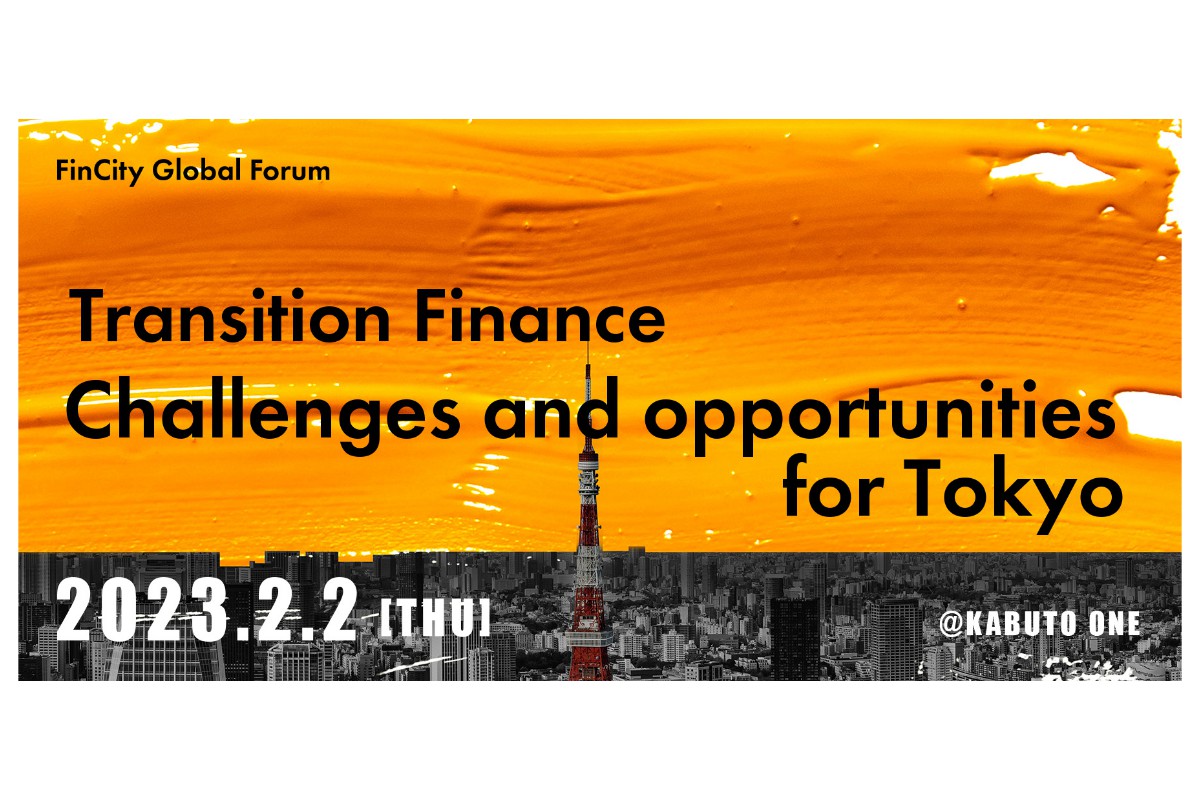Transition Finance, Challenges and opportunities for Tokyo (PR)
2023年01月27日 16時00分

Transition finance drives decarbonization of hard-to-abate sectors, or sectors for which reducing greenhouse gas emissions is difficult. The United Nations Framework Convention on Climate Change (COP 27) held in November 2022 saw high expectations for the role transition finance will play as a new financing approach that will pave the way for steady transition to a decarbonized society.
The Organization of Global Financial City Tokyo (FinCity.Tokyo, Chairman: Hiroshi Nakaso, former Deputy Governor of the Bank of Japan) will host “FinCity Global Forum—Transition Finance, Challenges and opportunities for Tokyo” in February 2023. The forum will provide information and make recommendations on financial support for decarbonization, involving an all-Japan team that includes Financial Services Agency, Ministry of Economy, Trade and Industry, and Ministry of the Environment, as well as financial industry groups, financial institutions, and private sector companies.
This special report, a three-part series planned in connection with the FinCity Global Forum, looks at the current situations of transition finance and introduces initiatives of FinCity.Tokyo.
◆◆Transition finance is spreading rapidly—Decarbonize society with the power of finance
In October 2021, the Japanese government adopted a cabinet decision to cut greenhouse gas (GHG) emissions by 46% compared to the 2013 level by 2030. It aims to achieve carbon neutrality, or a balance between emissions and removals of GHG in the atmosphere, by 2050. Stopping global warming is an urgent task as it causes extreme weather such as droughts and floods. This, however, requires a huge amount of funds, as there are many hurdles to overcome. They include developing energy saving technologies and investing in new plants and equipment, as well as reviewing the entire production activity across society. Transition finance is about financing the transition to a decarbonized society, and it is no exaggeration to say that successful expansion of transition finance is the key to stopping global warming.
Transition finance is explained as an approach that involves evaluating companies’ decarbonization efforts based on their long-term perspectives, and financing them in the forms of investments and loans. It is a type of sustainable finance aimed at creating a sustainable economy or society. And beyond that lie Sustainable Development Goals adopted by the General Assembly of the United Nations in September 2015 and the Paris Agreement that provided a framework for international cooperation to combat threats posed by climate change.
For the purpose of preserving the earth’s environment, green finance plays a role. Green finance involves financing certain environmental projects, such as introducing renewable energy, by issuing bonds, taking up loans, or raising funds by other means, with the use of the funds limited to those projects.
In practice, however, industries vary significantly in, among other factors, how much GHG they emit, the level of difficulty they face in cutting GHG emissions, and the amount of capital investment required for the emissions reduction. If green finance, which values short-term decarbonization achievements, is the only financing approach that encourages efforts to combat global warming, some companies will not be able to secure sufficient funds despite their support for the goal. Moreover, large emitters such as iron and steel, power, and chemical companies are among sectors in which GHG emissions tend not to be reduced in a short term. Therefore, a disruption in their initiatives could slow the entire progress of decarbonization.
◆Developing roadmaps
In the area of transition finance, Japan’s Financial Services Agency (JFSA), Ministry of Economy, Trade and Industry (METI), and Ministry of the Environment (MOE) jointly published Basic Guidelines on Climate Transition Finance in May 2021. Similar to Climate Transition Finance Handbook published by the International Capital Market Association in December 2020, the guidelines cover disclosure-related issues, disclosures, and third-party review for four elements—climate transition strategy and governance of companies raising funds, environmental materiality of business, science-based transition targets and pathways, and implementation transparency. The guidelines provide points of reference for comprehensively evaluating companies’ “transition strategy” for decarbonization and the implementation credibility and transparency of the strategy.
The guidelines highlight the importance of looking at not only the use of funds raised but also the credibility of fundraisers’ decarbonization strategy and implementation, when making investment decisions. The guidelines define, “Transition finance is a type of financing for entities that will ensure more ambitious initiatives for the future. This is because the fundraiser is clearly required to develop strategies to achieve long-term goals that align with the Paris Agreement.”
In October this year, the JFSA launched “Working Group on Financial Institutions’ Efforts towards the Decarbonization of the Economy.” The WG is expected to compile guidelines for financial institutions to dialogue with businesses on climate change by the next summer. In addition, the JFSA, the METI, and the MOE plan to develop a guidance for bond investors and others to show points that they should note in following up on their transition financing after execution. The guidance aims to enhance the effectiveness and credibility of transition finance.
Since science-based targets and pathways are needed for promoting transition finance, the METI has developed “roadmaps” for specific sectors as reference. They are intended for use by companies considering transition finance for taking measures to tackle climate change as well as financial institutions deciding whether companies’ decarbonization efforts qualify for transition finance.
Specifically, the roadmaps have been formulated for seven sectors— iron and steel, chemicals, power, gas, petroleum, paper and pulp, and cement—and cover, among other topics, their current status of production activity and carbon dioxide emissions, and trends in developing technologies for emissions reduction. For example, the roadmap for the iron and steel sector points out that the sector is yet to have established technologies for achieving carbon neutrality in iron-making processes. The roadmap introduces specific measures for reducing CO2 emissions, such as using more efficient equipment for blast furnaces or switching to larger blast furnaces. Also, the METI plans to develop a roadmap for the automobile sector in fiscal 2022.
The METI started a transition finance model project in fiscal 2021. It selected 12 companies as model cases, including JFE Holdings, Japan Airlines, Idemitsu Kosan, and thermal power generator JERA, and bore part of third-party evaluation expenses. The project remains in progress in fiscal 2022. The ministry also set up a system for providing interest subsidies of up to 0.2% for companies that have developed long-term (10 years or longer) plans for low-carbon transformation. The system is aimed at promoting transition finance. The METI expects to provide interest subsidies on loans of total 1 trillion yen over three years. To create a “virtuous cycle of economy and environment,” as pledged by the Japanese government in its Green Growth Strategy, the METI sees it necessary to help sectors for which cutting CO2 emissions is difficult with transition finance.
The MOE, too, has taken measures to lower the costs of financing initiatives for combating climate change. Its Financial Support Program for Green Bond Issuance, etc. provides subsidies to those who support entities issuing green bonds, such as external ratings providers and consulting firms helping them issue the bonds. Subsidies of up to 40 million yen per such supporter will be provided under the program in the form of subsidizing additional costs incurred when issuing green bonds on top of costs required for issuing traditional bonds.
◆For the expansion of transition finance in Asia
Financial institutions are pushing ahead with activities for widespread use of transition finance. A good example is the Asia Transition Finance Study Group (ATFSG).
The ATFSG is a private sector-led initiative launched in September 2021. Its participations include Japan’s three megabanks—Mitsubishi UFJ Financial Group, Mizuho Financial Group, and Sumitomo Mitsui Financial Group—as well as Asian banks and Barclays, which is active in Asia, and Western banks such as HSBC and UBS. Also, multiple public institutions take part in the initiative as observers. The ATFSG held a series of meetings to discuss issues associated with considering transition finance, with the aim of combating climate change, realizing sustainable economic growth, and ensuring “just and orderly transition” in Asia. It published two reports in September this year.
One is Asia Transition Finance Guidelines. They provide points, from practitioner perspectives, for financial institutions to refer to when considering transition finance. Various different guidelines and taxonomies have been published globally, but there are not many that consider Asia’s regional- or country-specific characteristics. To facilitate inflows of private funds, the ATF Guidelines provide recommendations on how to refer to these different guidelines, as well as approaches to take when standards to refer to do not exist in investee countries. Projects using the ATF Guidelines are expected to come out going forward.
Another is Asia Transition Finance Activity Report. Asian countries vary in the degree of their reliance on fossil fuels, potential for renewable energy, and the stage of economic development. Thus, various support from governments is essential for promoting “just and orderly transition” that considers characteristics of each region or country. In some cases, there are not country- or sector-level reference indicators that financial institutions require when deciding the suitability of corporate transition plans. Therefore, the activity report recommends that countries create various structures for driving transition, such as by developing roadmaps for decarbonization and cooperating internationally.
※ ※ ※
Public-private “all-Japan” team event
“FinCity Global Forum—Transition Finance, Challenges and opportunities for Tokyo”
https://financial.jiji.com/seminar/20230202/en/
*Applicants will be notified about archive streaming.
Organizer; FinCity.Tokyo
Date & Time: Thursday, February 2, 2023 13:00-17:50 (JST) (tentative)
Venue: KABUTO ONE Hall & Conference (7-1 Nihonbashi Kabuto-cho, Chuo-ku, Tokyo)
Sponsors (tentative): Financial Services Agency; Ministry of Economy, Trade and Industry, Ministry of the Environment; Japanese Bankers Association; The Investment Trusts Association, Japan; Japan Securities Dealers Association, Japan Investment Advisers Association; The Securities Analysts Association of Japan; CFA Society Japan; Japan Exchange Group; Tokyo Stock Exchange, The Alternative Investment Management Association (AIMA), The Consortium for Japan International Asset Management Center Promotion (JIAM)



![オペレーションF[フォース]](https://financial.jiji.com/main_news/img/opf_banner.jpg)